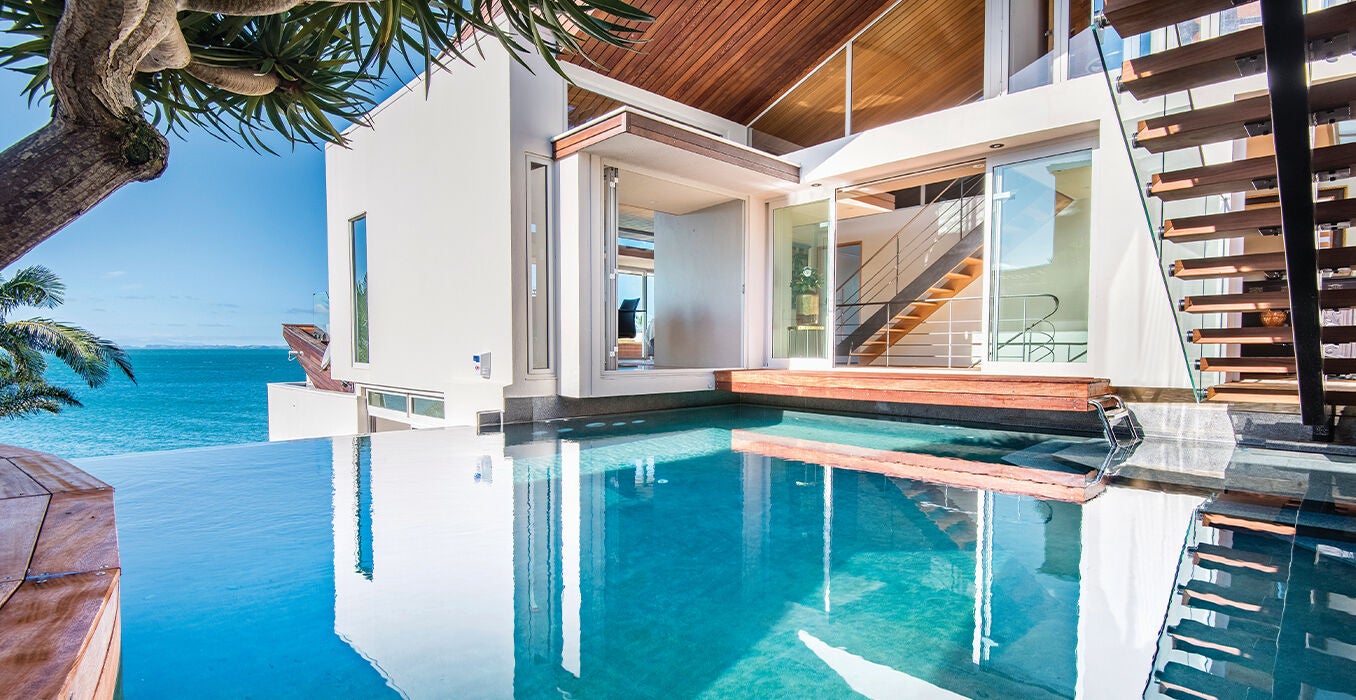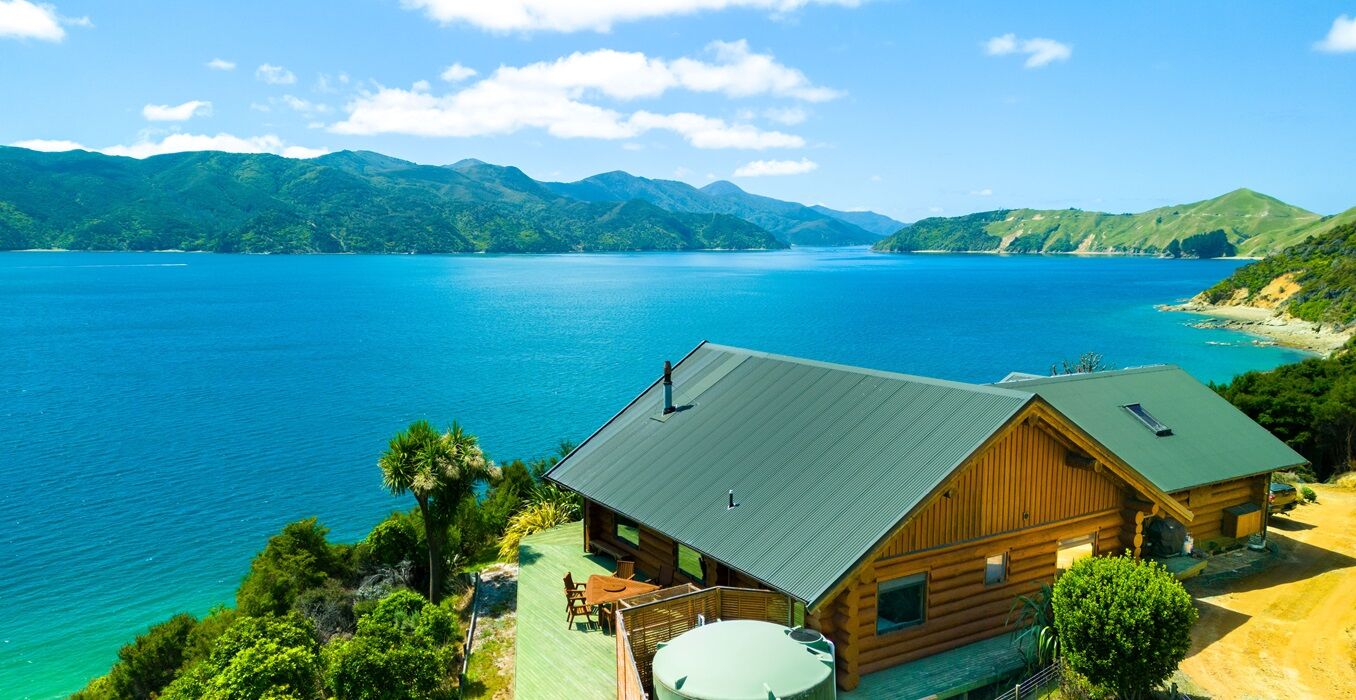Waterfront -
Making a splash

The appetite for waterfront property has not mellowed despite economic headwinds and there’s been some good buying opportunities, with strong migration and constrained housing supply likely to drive long-term price growth in the years ahead.
Bayleys’ Insights and Data team has released its Q3 Waterfront Residential Update, looking at waterfront sales data in the year to 31 March 2024, its second in an annual series. Analyst Eos Li says the research allows the waterfront market to be quantified across New Zealand.
“There were an estimated 1,561 waterfront property sales across New Zealand between April 2023 and March 2024, with an average sale price of $1,265,825.
“Trophy homes often come to mind when you think of a waterfront property, but our analysis shows the majority of waterfront sales involve more mainstream properties, typically backing onto smaller waterways. This was particularly apparent in the Auckland region where many of the sales were located in lower priced sectors of the market.”
“Waterfront locations are however still a common defining point for trophy homes across New Zealand. Bayleys’ research into super prime residential sales shows that waterfront parcels were in play for 35 percent of Auckland sales above $7.5 million and 45 percent of other regions’ sales above $5 million.”
With industry commentators and economists tipping further interest rate relief ahead, and with inflation now within the Reserve Bank’s target band, Li says waterfront property values will likely trend upwards.
“Even with the post-pandemic correction in prices, buyers still paid an average 45-percent price premium over surrounding non-waterfront homes showing they saw value in that market segment.”
Auckland, Bay of Plenty and Otago led the way when it came to sales price, aligning with generally overall higher house prices in those regions. Below is a tiki tour around New Zealand to check out how different markets are faring.
Sounds good
Will Porter of Bayleys Marlborough, says the Marlborough Sounds market offers “insanely varying” landscapes within an area boasting around one-fifth of New Zealand’s total coastline.
“You can stand on a high point and look across three different Sounds, all offering their own unique scenery, climate, wildlife and property, and you could explore for a lifetime without visiting the same place twice.
“Catch some groper in the Cook Strait in the morning, have lunch at a boutique winery on the Wairau Plains, then finish the day on the Rainbow ski field slopes – not many other regions can offer that lifestyle!”
Spots that enjoy the best views without being miles from the nearest town are most in-demand, as this expands the potential buyer pool from just holidaymakers to retirees, and working families.
“Areas like Anakiwa, Queen Charlotte Drive, Moetapu Bay and Okiwi Bay are enduringly popular because they’re close to Picton or Havelock and can be accessed by road.
“That said, the Sounds have never been so easy to access with multiple water taxis running every day. Some people opt to ride-share to ease the cost by ‘boat’ pooling with workers heading out to marine farms, or they catch a ride with one of the mail boats that visit every bay.
“There are also numerous airstrips throughout the Sounds, with small planes or helicopters departing Wellington or Picton, plus a float plane to land people directly at their destination, albeit rather weather dependant.”
After a period of stable sale prices, Porter says values are trending upwards again.
“Naturally interest rates have a huge influence on the waterfront market as many properties are viewed as luxury assets. The first things that New Zealanders buy when the ‘going is good’ are the boat and the bach.
“Bare land sales stalled with rising construction costs and this further challenged the feasibility of remote projects, but with some relief in material pricing and more budget-friendly building options like kitset dwellings and glamping emerging, enquiry levels on bare blocks are rising.”
With many waterfront buyers effectively priced out of hotspots like the southern lakes areas of Queenstown and Wānaka, and the upper half of the North Island, Porter says the Sounds always attracts expat Kiwis looking for a bolt-hole back home.
“There’s also that nostalgic and emotional connection to the Sounds area. Picton is a main gateway to the South Island and many buyers have fond memories of road trips, camping holidays and fishing expeditions with friends and family having crossed the Strait on the ferry.
“With technology making it easier and easier for people to cross the Cook Strait from the North Island in their own boats, we are now seeing increased demand for property in the outer Sounds.
“Buyers could pick up prime untouched coastal land for a fraction of the price that property closer to town commands, freeing up more funds to create that dream waterfront getaway.”

Shored up
On Auckland’s North Shore, home to some of the region’s highest value waterfront property including that of Milford, Devonport and Takapuna, Bayleys waterfront specialist Victoria Bidwell says the locational benefits underpin values, regardless of real estate cycles.
“More recently, activity at the top end of the market has been a little subdued, but lower and mid-range waterfront properties have been transacting well.
“Buyers at the higher end of the market – that’s $5-million-plus – can afford to wait and see what the market offers up, and there is generally not a sense of urgency for vendors, either.
“Waterfront property across the North Shore market is not as reactive to interest rate fluctuations given the typical higher net wealth buyer profile.
“However, I’d expect to see good activity over the summer months, particularly as the broader economic outlook is signalled to improve which will give consumer confidence a welcome boost, and as capital tied up in term deposits is released for property acquisition.”
New Zealand’s lake district
Bayleys Rotorua manager Beth Millard says Lake Rotoiti continues to dominate the Rotorua Lakes waterfront market for growth in value.
“There’s been rapid price appreciation for Rotoiti property, with a record-breaking sales value trajectory. Remarkably, the first $3-million-plus sale was only recorded in 2020, and since then, Rotoiti has consistently set new benchmarks across its many bays,” she says.
“While Lake Tarawera has long attracted attention with its pristine waters, stunning views of Mount Tarawera and geothermal virtues, there is a wider fluctuation of property values. This is linked to land size, improvements, the quality of mountain and lake views, and access to unique geothermal features, including the famed Hot Water Beach, offering warm relief from the cooler waters.
“Lake Ōkāreka is equally sought-after, particularly with owner-occupiers wanting year-round living as it’s just 12 minutes from Rotorua’s CBD. It also boasts great outdoor attractions like the nearby Redwood Forest with world-class mountain biking trails.”
Across all lakes, there is insatiable demand for bare lakefront land, explains Millard.
“Such sites are extremely scarce and, therefore, highly coveted. Interestingly, the rising construction costs have not dampened demand in the lakes market and one of the reasons for its resilience, even during broader real estate downturns, is the overall lack of supply.
“Unlike some other regions that experienced an oversupply of properties post-pandemic, the lakes market has seen sustained demand and a scarcity of available properties, keeping values high, even as the broader property market has trended downwards.”
Buyers in the Rotorua lakes district are primarily from the North Island, with a strong contingent from the Bay of Plenty and Waikato. Lake Rotoiti is particularly popular with buyers from Mount Maunganui and Tauranga, owing to its close proximity with the short 45-60-minute commute allowing families to enjoy weekends at their lake houses without sacrificing their children’s sporting commitments.
“Across locations, the most sought-after lake properties have direct water access – those coveted lawn-to-lake properties are gold – where homeowners can watch their children play in the water while sipping a glass of wine on the deck.
“The absence of sand and salt is a huge advantage to lakeside living, with easier property maintenance, and less impact on boats and fishing gear. With no tides, lakes are more predictable and seen as safer than the ocean for water sports, making them ideal for activities like wake surfing, which has become increasingly popular.”
Take me to the river
Rachel Waldegrave of Bayleys Waikato says any property directly connected to the Waikato River holds a prestigious place in the collective psyche of the region and as such, commands a premium price.
“The Waikato River represents the ‘Mauri’, or the life force, of the region and holds great value to all who live here. As a result, riverfront property sits at the top end of our residential real estate market with buyers entering from other markets soon appreciating that in Hamilton, property value has a direct correlation to proximity to the river, rather than suburb versus suburb.
“There’s also a very opinionated ‘battle’ between those who live on the east side of the river and those who love the west. Both believe their side of the river is the best and most valuable, in terms of property ownership.”
Waldegrave says riverfront property has generally held its value despite the more-recent fairly flat property market nationally.
“With a finite number of properties in Hamilton being absolute, true waterfront and virtually no river-adjacent bare land sites available, property fronting the Waikato River will always command a premium – regardless of what wider market trends are doing.
“This year alone we have seen the record broken for the highest sale price in Hamilton – for both a single title site and also for a dual title site; one of these had direct river access, and the other had expansive river views with only the Hamilton Golf Club between it and the river itself.”
Traditionally, the Hamilton CBD has turned its back to the river, but Waldegrave says, thankfully, this is finally changing with proactive and visionary local developers acknowledging the key role the river plays in the city’s personality.
“They’re refreshing the central city to embrace the beautiful natural resource we have flowing through its heart, and consequently, suburbs adjacent to the river such as Riverlea and Pukete, are finally starting to emerge as desirable.”
“Hamilton is the fastest growing city in New Zealand, with the Waikato region seen as a great place to live, work and play, as well as having reasonable property prices compared to the likes of Auckland and Wellington.
“Buyers are often looking to escape ‘the rat race’ and get closer to nature and this holds true for those relocating from other parts of New Zealand, and expats returning from large cities overseas.
“Those buyers do not want to replicate what they may have just left in big cities such as London or Singapore. Consequently, a nice piece of land, with a slower pace of life, beautiful views over the river, or our hydro lakes, really appeal to this international market.”
Waldegrave says the Waikato River is everchanging and has an energy that is incredibly special.
“People embrace this in a very hands-on way with kayaking, rowing and other water sports, and they also appreciate the variety of wildlife making the river home.”